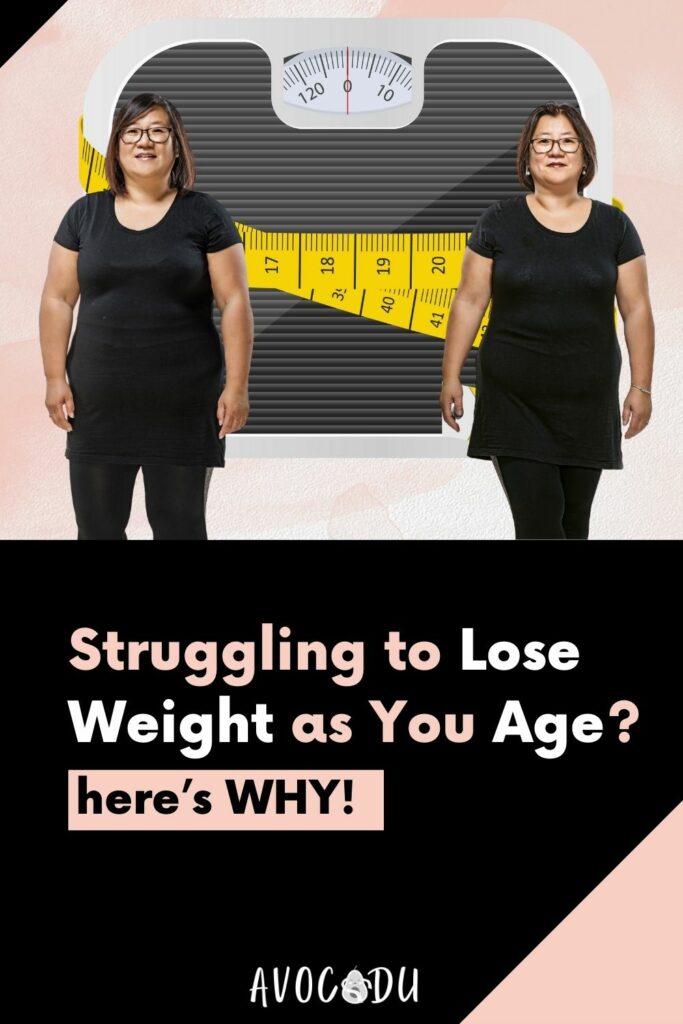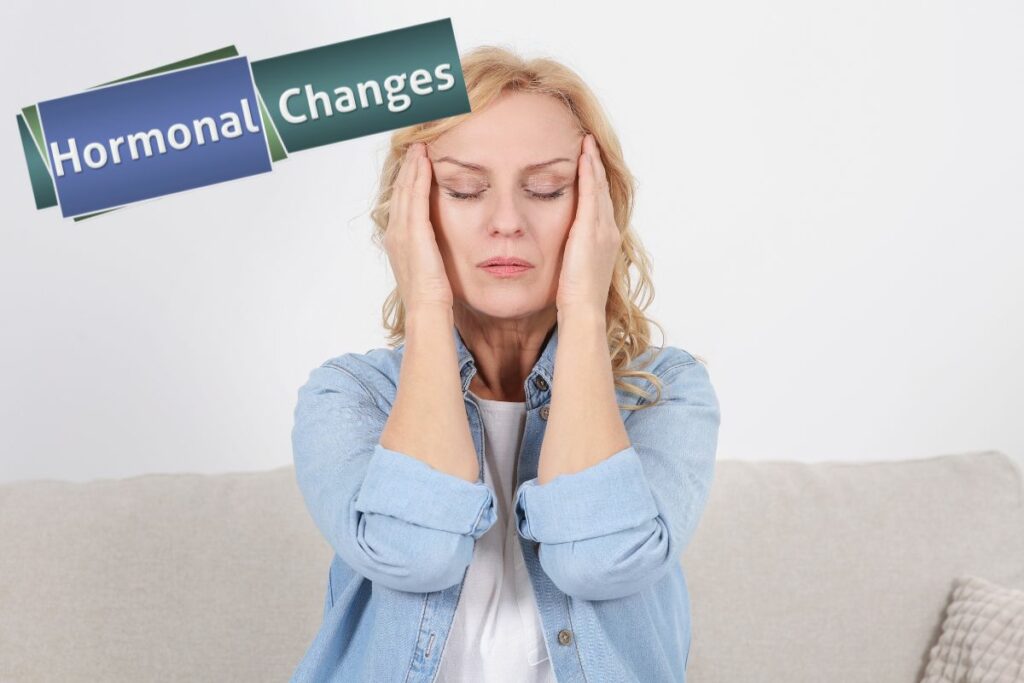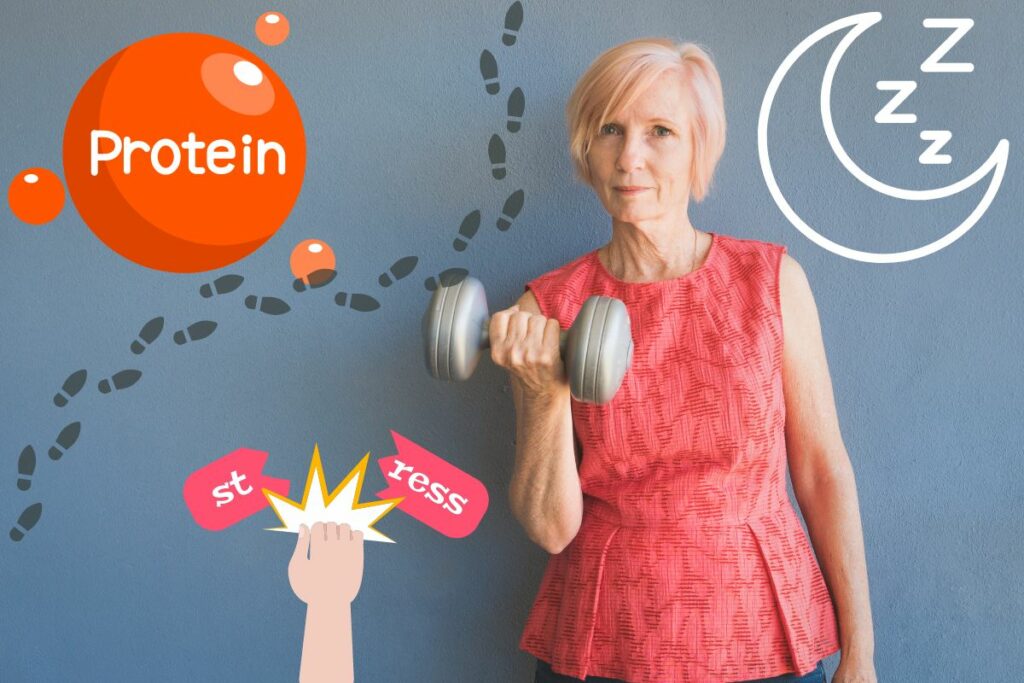Why Is It Harder to Lose Weight as You Get Older?
You’re eating well, exercising regularly, and doing all the right things, but the scale seems stuck. Sound familiar?
For many women in their 40s, 50s, and beyond, losing weight can feel like a battle you just can’t win. What used to work in your 20s now barely makes a dent, and it’s beyond frustrating when the pounds refuse to budge.
Fitting into your favorite jeans is just one aspect affecting your life—those extra pounds can also influence your energy levels, mood, and overall confidence day in and day out.
But here’s the thing: it’s not about trying harder or cutting more calories. Your body is going through natural changes that make weight loss tougher, and what worked before simply may not be enough anymore.
Here’s why it can become harder to lose weight as you get older:
- Slower Metabolism: Your body burns fewer calories at rest as your metabolism slows down with age.
- Hormonal Changes: Fluctuating hormones, especially around menopause, can lead to fat storage and weight gain, particularly in the midsection.
- Muscle Loss: As muscle mass decreases, so does your body’s ability to burn calories efficiently.
- Lifestyle Factors: Stress, lack of sleep, and changes in physical activity levels can make weight loss more challenging.
The good news? Once you understand why this happens, you can adapt your approach and start seeing the results you deserve.
Let’s take a deeper look at what’s really going on and how you can overcome these challenges.

This post may contain affiliate links, which helps keep this content free. Please read our disclosure for more info.
Slower Metabolism
One of the biggest hurdles women face as they age is a slowing metabolism. Your metabolism is the process by which your body converts the food you eat into energy, and it plays a key role in how many calories you burn throughout the day—even when you’re at rest.
As you get older, this metabolic rate naturally declines, starting in your 30s but becoming much more noticeable as you hit your 40s, 50s, and beyond.
Suddenly, the same diet and exercise routine that kept you trim in your 20s just doesn’t seem to cut it anymore.
So, what’s actually happening? A big part of it comes down to muscle mass. As you age, you naturally lose muscle in a process called sarcopenia.
Muscle is metabolically active, meaning it burns more calories than fat, even when you’re not moving. So, when your muscle mass decreases, your body needs fewer calories to function, and the calories you do consume aren’t burned off as efficiently. This is why you might find that even with no major changes to your eating habits, the scale starts creeping up.
Another factor is that as your metabolism slows, your body becomes more efficient at storing fat.
This evolutionary trait was beneficial for our ancestors during times of food scarcity, but in today’s world, it just means that your body is more likely to store those extra calories as fat, especially around your midsection.
However! This shift doesn’t mean that your weight loss efforts are useless, but it does mean you’ll need to rethink your approach.
Simply cutting calories or exercising more might not be enough anymore. You’ll need to focus on strategies that help preserve or even build muscle to keep your metabolism as active as possible.
Resistance training, prioritizing protein in your diet, and avoiding drastic calorie cuts can all make a big difference.
By making these adjustments, you can combat the effects of a slowing metabolism and still achieve your weight loss goals.
Hormonal Changes

Hormonal shifts can create major roadblocks for women trying to manage their weight, especially as they age.
Four key hormones—estrogen, progesterone, testosterone, and cortisol—all play critical roles in how your body processes and stores fat. As these hormone levels fluctuate, especially during menopause, weight loss can feel nearly impossible.
Here’s how each one impacts your body and why they make it harder to shed pounds as you get older.
Estrogen
Estrogen, the primary female hormone, significantly affects how your body stores fat. As you approach menopause, estrogen levels begin to drop, and this change triggers a shift in fat storage.
Instead of distributing fat evenly, your body starts to hold onto it around the midsection, often resulting in the notorious “menopausal belly fat.”
Estrogen also helps regulate how your body responds to insulin, the hormone that controls blood sugar levels.
When estrogen drops, your body can become more insulin-resistant, which means your blood sugar isn’t processed as efficiently.
This leads to more fat storage, especially around the abdomen, and makes it harder to burn fat even with proper diet and exercise.
Progesterone
Progesterone, another key hormone, also declines as you age. Low progesterone levels are often associated with water retention and bloating, which can make you feel heavier and more sluggish.
While the weight gain from progesterone fluctuations is usually due to water retention rather than fat, it can still be frustrating and demotivating, especially if you’re trying to lose weight.
Additionally, progesterone plays a role in sleep quality, and low levels can lead to insomnia or disrupted sleep, which in turn impacts your ability to regulate hunger and satiety, making it more difficult to stick to a healthy eating routine.
Testosterone
Yes, women produce testosterone too, and it plays a crucial role in maintaining muscle mass and boosting metabolism.
As you age, your testosterone levels decline, leading to a reduction in muscle mass. Since muscle burns more calories than fat, losing muscle means your metabolism slows down, making it easier to gain weight and harder to lose it.
Lower testosterone levels can also lead to a decrease in energy, which may reduce your motivation to stay active, further compounding weight gain over time.
Cortisol
Cortisol, the body’s stress hormone, tends to rise as you get older, particularly during menopause.
Chronic stress or elevated cortisol levels cause your body to hold onto fat, especially in the abdominal area, as a survival mechanism.
High cortisol also increases cravings for sugary and fatty foods, making it harder to resist unhealthy snacks.
When cortisol levels are consistently high, it can lead to what’s known as “stress belly” fat, which is difficult to lose even with regular exercise and healthy eating habits.
Additionally, stress can disrupt sleep, and poor sleep is linked to higher cortisol levels, creating a vicious cycle that promotes weight gain.
How These Hormones Work Together
The interplay between these hormones—especially the decline in estrogen, progesterone, and testosterone, alongside the rise in cortisol—can make weight loss a more difficult and frustrating process as you age.
Each hormone plays a specific role in regulating how your body stores and burns fat, as well as how you manage appetite, cravings, and energy levels.
If you suspect your hormones are out of balance and making weight loss harder, you can request a hormone test from your doctor to confirm your suspicions. These tests can also help determine if you’re entering perimenopause, which is often when many of these hormonal changes begin.
Understanding these hormonal changes can help you adjust your weight loss strategies, focusing on building muscle, managing stress, and prioritizing sleep and healthy eating habits to better support your body through these transitions.
Muscle Loss and Less Activity

As you get older, your body naturally begins to lose muscle mass, a condition known as sarcopenia.
Muscle plays a vital role in keeping your metabolism running efficiently because it burns more calories than fat, even when you’re at rest.
When you start to lose muscle, your body needs fewer calories to function, which can make it easier to gain weight and harder to shed those extra pounds.
Unfortunately, this muscle loss typically starts in your 30s and accelerates as you age, unless you take specific steps to maintain or rebuild it.
To make matters more challenging, many women find themselves becoming less active as they get older. This can be due to a number of reasons: increased work responsibilities, family obligations, or simply the fact that as the body ages, it doesn’t move as easily as it used to.
Joint pain, stiffness, or fatigue may make physical activity feel more daunting, and as a result, many women find themselves leading more sedentary lifestyles.
This combination of muscle loss and decreased activity can slow your metabolism even further, making it easier to gain weight and harder to lose it. It’s a gradual process, but over time, this shift in body composition—less muscle, more fat—can contribute to a creeping weight gain that becomes harder to reverse.
Changes in Lifestyle and Habits
As life gets busier and more complex, maintaining a healthy weight can become increasingly challenging.
With career demands, family responsibilities, and personal obligations piling up, it’s easy to slip into habits that unintentionally work against your weight loss efforts.
One of the biggest culprits is stress. As stress levels rise, your body produces more cortisol, a hormone that’s closely tied to fat storage—especially around the midsection.
This is your body’s way of responding to perceived threats, but in today’s world, those “threats” are often ongoing work deadlines, family pressures, or financial worries rather than actual danger.
High cortisol levels not only make it easier for your body to store fat, particularly in the abdominal area, but they also contribute to increased cravings for sugary or high-calorie comfort foods. This creates a vicious cycle of stress-eating that can quickly lead to weight gain.
Sleep is another area that often suffers with age, and its impact on weight is more significant than many realize.
Whether it’s due to the physical changes of aging, hormonal fluctuations, or simply a packed schedule, poor sleep quality can throw your metabolism off balance.
When you don’t get enough sleep, your body produces more ghrelin, the hormone that signals hunger, while reducing levels of leptin, the hormone that signals fullness.
The result? You’re more likely to overeat and crave unhealthy foods, especially late at night. Over time, these disrupted sleep patterns can contribute to gradual weight gain and make it harder to lose weight.
Then there are the changes in eating habits that often come with a busy lifestyle. Over the years, you may have started to rely more on quick, convenient meals to save time.
Unfortunately, many of these options are highly processed and calorie-dense, making it easier to consume more calories than you realize.
Fast food, takeout, and packaged snacks are often loaded with unhealthy fats, sugar, and salt, which not only contribute to weight gain but also make it harder to break unhealthy cravings.
Additionally, with time being a precious commodity, many women find themselves skipping meals or eating on the go, which can lead to overeating later in the day or poor food choices when hunger strikes.
All of these factors—chronic stress, poor sleep, and shifts in eating habits—create a perfect storm that makes weight loss more difficult as you get older.
Even if you’re trying to eat healthy or stay active, these underlying lifestyle changes can undermine your efforts, leading to a gradual but persistent weight gain over the years.
Managing Weight Loss as You Age

It’s true that losing weight becomes more challenging as you age, but it’s far from impossible.
While factors like a slower metabolism, hormonal changes, and lifestyle shifts can make the process more difficult, there are several practical strategies that can help you manage your weight and feel your best.
Here’s a breakdown of what you can do:
Focus on Strength Training
One of the most effective ways to combat age-related weight gain is to maintain or even build muscle mass through strength training.
By incorporating strength training exercises like weightlifting, resistance band exercises, or bodyweight movements (such as squats, lunges, and push-ups) into your routine, you can help preserve and build muscle.
This, in turn, keeps your metabolism running efficiently and helps your body burn more calories, even when you’re at rest.
At a minimum, aim for at least two strength training sessions per week, focusing on all major muscle groups, to keep your muscles strong and active.
Not only does strength training help with weight management, but it also improves bone density, balance, and overall strength, which are crucial as you age.
Eat Protein-Rich Foods
As you work to build or maintain muscle, protein becomes essential. Protein supports muscle repair and growth, and it also helps you feel fuller for longer, which can curb overeating and snacking.
Including lean sources of protein in your meals—such as chicken, fish, eggs, turkey, and plant-based options like lentils, chickpeas, and tofu—can help you meet your body’s needs.
For best results, try to distribute your protein intake throughout the day by including some at every meal, rather than consuming it all at once.
This keeps your body in a constant state of muscle repair and growth.
Don’t forget to pair your protein with plenty of fiber-rich vegetables and whole grains, which not only support digestion but also help regulate blood sugar and keep your energy levels steady.
Manage Stress
Stress is one of the most overlooked contributors to weight gain, particularly as you age. Chronic stress triggers the release of cortisol, a hormone that encourages fat storage, especially around your abdomen.
To counteract this, it’s important to incorporate stress-relieving practices into your routine.
Activities like yoga, meditation, deep breathing exercises, and even simply taking time each day to unwind can help reduce cortisol production and prevent stress-induced weight gain.
It’s impossible to eliminate stress entirely—that’s unrealistic—but rather learn to manage it in a way that doesn’t affect your health.
By lowering your stress levels, you can also reduce cravings for comfort foods and emotional eating, both of which can sabotage your weight loss efforts.
Prioritize Sleep
Quality sleep is often the missing piece in weight management. When you don’t get enough sleep, or your sleep is disrupted, it throws your hunger hormones—ghrelin and leptin—out of balance.
Ghrelin, the hormone that stimulates appetite, increases, while leptin, the hormone that signals fullness, decreases. This imbalance can lead to overeating, especially cravings for high-calorie, sugary foods.
Additionally, poor sleep is linked to higher levels of cortisol, which can further contribute to weight gain. To support your weight loss goals, aim for 7-9 hours of good-quality sleep each night.
Establish a bedtime routine that helps you wind down, such as turning off screens an hour before bed, creating a relaxing environment, and going to bed at the same time each night.
Consistent, restful sleep not only helps regulate your hunger hormones but also improves your energy levels, mood, and overall well-being.
Stay Active
As you get older, staying active is more important than ever—but it doesn’t have to mean spending hours at the gym. Regular movement is key to burning calories, maintaining muscle, and improving cardiovascular health.
Find activities that fit your lifestyle and that you enjoy, whether it’s brisk walking, swimming, dancing, or gardening.
Even if you’re busy, try to incorporate movement into your daily routine—take the stairs, walk during lunch breaks, or do a quick 10-minute workout at home.
Staying active not only helps you burn calories but also keeps your body flexible, boosts your mood, and supports overall health.
It’s not about doing the most intense workout possible—it’s about being consistent and keeping your body moving regularly in ways that feel good to you.
By focusing on these key areas—strength training, a protein-rich diet, stress management, quality sleep, and regular activity—you can create a balanced, sustainable approach to managing your weight as you age.
While the process may require more intention than it did when you were younger, these strategies can help you feel strong, energized, and in control of your health.
Taking Control of Your Weight Loss Journey
Losing weight as you get older can feel like an uphill battle, but it’s important to remember that it’s not impossible. While your body changes, your approach to weight loss just needs to evolve with it.
By prioritizing muscle maintenance, eating smarter, managing stress, getting quality sleep, and staying active, you can still achieve your goals.
If you’re looking for a structured way to jumpstart your weight loss and start building healthier habits, the 21-Day Fat Loss Challenge might be exactly what you need.

This program offers a clear, guided path to help you lose weight effectively while focusing on what works for your body as it changes with age.
In just 21 days, you’ll develop habits that can set the foundation for lasting results.
Ready to take the next step? Learn more about the challenge here and start seeing the changes you’ve been working for!



